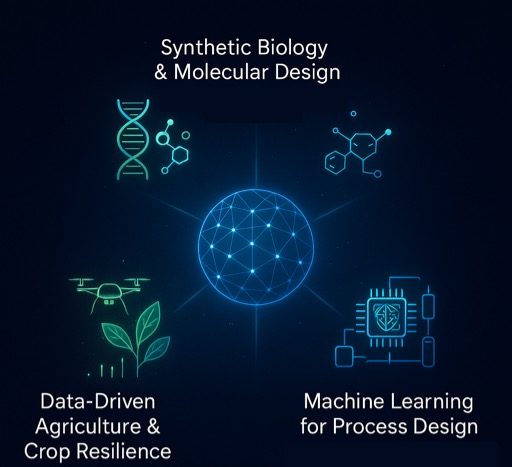The GrimmLab unites bioinformatics and machine learning to advance data-driven innovation in the bioeconomy. We develop cutting-edge AI and statistical methods to understand how complex biological systems function and how their biochemical properties can be modelled, analysed, and optimised for sustainable applications.
Our research focuses on identifying genotype–phenotype relationships and extracting meaningful phenotypic traits from imaging and omics data, driving progress in genetics, precision medicine, and sustainable agriculture.
An emerging focus of the lab is the development of AI systems capable of learning and reasoning about biology and chemistry without prior domain knowledge, enabling autonomous scientific discovery and supporting the transition to a circular, sustainable bioeconomy.
Our work is structured around three major application pillars:
- Synthetic Biology and Computational Biotechnology
At GrimmLab, we explore the intersection of synthetic biology and molecular design. Our team develops machine learning methods to design molecules and enzymes in silico, combining statistical learning, reinforcement learning, and generative models with experimental data. This integration allows us to accelerate the discovery of bio-based catalysts and materials for sustainable bioproduction. Through this work, we’re advancing computational biotechnology to support a circular bioeconomy and enable the creation of innovative enzymes and biomaterials that power a more sustainable future.
- Computational Breeding and Sustainable Agriculture
The second pillar of our research focuses on enhancing crop resilience and resource efficiency through data-driven approaches. At GrimmLab, we integrate genomic prediction, genome-wide association studies (GWAS), and high-throughput phenomics with advanced machine learning models that connect genotype, phenotype, environment, and management data. We also leverage remote sensing technologies, including UAV-based imaging, to monitor crop health and detect weeds and diseases early. By combining these insights with socio-economic and ecological assessments, we provide a holistic foundation for breeding and management decisions that foster sustainable and resilient agricultural systems.
- Computer-Aided Chemical and Bioprocess Engineering
The third pillar of our research explores how machine learning can revolutionize the design of chemical and biotechnological processes. At GrimmLab, we focus on flowsheet synthesis—a complex task traditionally driven by expert intuition and experience. We develop reinforcement learning and neural combinatorial optimization (NCO) methods that enable artificial agents to autonomously generate process flowsheets by interacting with simulators and learning from feedback, without relying on predefined engineering rules. Our goal is to create generalizable, data-driven workflows that can be applied across diverse process systems, unlocking new opportunities for energy- and resource-efficient bioprocesses that accelerate the shift toward a sustainable bioeconomy.
